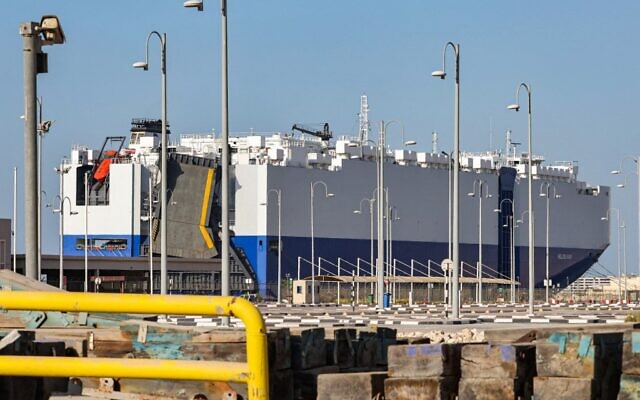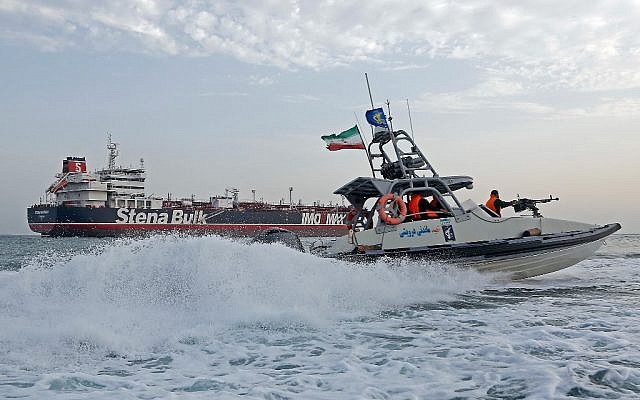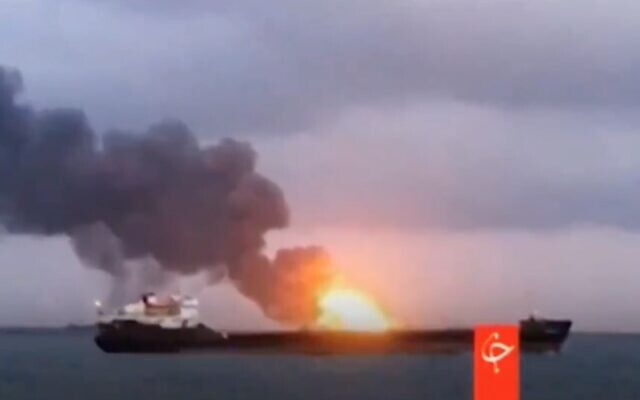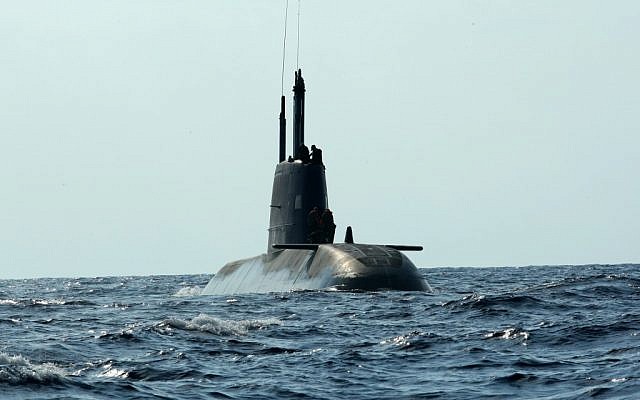The once-covert maritime war between Israel and Iran seemed to escalate further on Thursday night, when an oil tanker operated by an Israeli-owned company was struck by armed drones off the coast of Oman.
Two ship crewmen, a British and a Romanian national, died in the attack on the Mercer Street, a ship operated by Zodiac Maritime, a London-based company belonging to Israeli tycoon Eyal Ofer.
Analysts said the attack bore all the hallmarks of tit-for-tat exchanges in the shadow war between Israel and Iran, in which vessels linked to each nation have been targeted in waters around the Gulf.
But the latest incident seemed like a significant and perhaps dangerous departure from the established rules of the game, in that it was the first known fatal attack after years of assaults on commercial shipping in the region.
The US and Britain followed Israel in blaming Iran for the attack, with US Secretary of State Antony Blinken promising Monday that “there will be a collective response.”
Earlier Monday, Iran pledged that it would “not hesitate to protect its security and national interests, and will immediately and decisively respond to any possible adventurism.”
.@SecBlinken on Mercer Street tanker attack: “There is no justification for this attack on a peaceful vessel on a commercial mission in international waters. Iran’s action is a direct threat to freedom of navigation and commerce.” pic.twitter.com/3kGuCOEN91
— Department of State (@StateDept) August 2, 2021
Despite the widespread belief that Iran was directly responsible for the lethal strike, the attack should not be seen as a significant chapter in the long struggle between Iran and Israel. Nor should Israel expect major world powers to act militarily against Tehran, despite Blinken’s tough-sounding message.
“I don’t think it’s going to change the big picture,” said Yoel Guzansky, a senior research fellow at the Institute for National Security Studies in Tel Aviv.
Iran’s modus operandi
The attacks on Israel-linked ships come as Iran is being blamed for a parallel campaign against US forces in Iraq and western Syria. Bases housing US troops and contractors have been struck by missiles and drones launched by Iranian-backed militias in Iraq.
Iran has made sure to avoid any direct involvement in these low-level, rather unsophisticated strikes, and Islamic Revolutionary Guard Corps leader Esmail Ghaani was even said to have tried unsuccessfully to urge the militias to refrain from attacks on Americans until after the nuclear deal, known as the JCPOA, is reconstituted.

In this photo released by the official website of the Office of the Iranian Supreme Leader, Gen. Esmail Ghaani, newly appointed commander of Iran’s Revolutionary Guards Quds Force, weeps while praying over the coffin of the force’s previous head Gen. Qassem Soleimani at the Tehran University Campus in Tehran, Iran on January 6, 2020. (Office of the Iranian Supreme Leader via AP)
“The shipping attacks are a bit different because they’re clearly carried out by the Iranians,” said Jack Watling, a research fellow at the Royal United Services Institute in the United Kingdom.
Though Iran vehemently denies any involvement in Thursday’s maritime strike, it has no proxies that could have carried it out. The only Iran-backed group that could operate drones that far south is the Houthis in Yemen, but they don’t have the means of carrying out such a sophisticated attack.
The Houthis do, however, have a record of claiming responsibility for drone and missiles attacks that were clearly the work of Iranian forces. The Houthis, for example, said they carried out the September 2019 Aramco strikes that temporarily cut Saudi oil production in half, but major world powers, as well as the Saudis, agreed it was an Iranian operation.
“The Houthis have a long history of activity where their claims don’t match up with what happened, where they’re claiming actions that the Iranians conducted,” Watling pointed out. “I think it’s pretty clear that Iran is responsible and not the Houthis in this case.”

During a trip organized by the Saudi information ministry, workers fix the damage in Aramco’s oil separator at processing facility after the September 14 attack in Abqaiq, near Dammam in the Kingdom’s Eastern Province, September 20, 2019. (AP Photo/Amr Nabil)
“The Mercer Street attack marks the confluence of two trends in Iranian regional aggression: attacking commercial vessels at sea and using drones,” Ari Cicurel, a senior policy analyst at the Jewish Institute for National Security of America, told The Times of Israel.
“This latest attack represents a growing tendency by Iran and its proxies to use drones, particularly armed suicide drones across the Middle East, which are challenging for existing air defense systems to intercept,” he said.
It is unclear exactly what Iran was seeking to accomplish with the attack, though it seemed to fit an Iranian pattern of striking Israel-linked vessels in response to Israeli actions in Syria or at sea.
On February 26, a blast struck the Israeli-owned MV Helios Ray, a Bahamian-flagged cargo ship, in the Gulf of Oman. The operation seemed to have been carefully planned, and mirrored a series of attacks on tankers in 2019 and an Iranian campaign against shipping vessels four decades ago.

This picture taken on February 28, 2021 shows a view of the Israeli-owned Bahamian-flagged MV Helios Ray cargo ship docked in Dubai’s Mina Rashid (Port Rashid) cruise terminal. (Giuseppe CACACE / AFP)
In subsequent months, other Israeli-owned ships came under missile fire in the Indian Ocean.
The Mercer Street strike would appear to fit that pattern.
Tehran certainly didn’t intend to sink the Mercer Street, as the drones carried a small payload and targeted the superstructure, not the hull, of the ship, similar to the strikes against other Israel-linked ships.
The attack might also have been influenced by the stalled Vienna nuclear talks.
“Iranian projectile attacks seek to increase Tehran’s influence in the Middle East and pressure the United States to reenter the JCPOA,” said Cicurel. “With a hardline Iranian president taking office, Iran may be testing the resolve of the new Israeli government, as well as the UK and US governments.”

File: Russia’s envoy to the International Atomic Energy Agency (IAEA), Mikhail Ulyanov, stands in front of the Grand Hotel Vienna where closed-door nuclear talks with Iran take place, in Vienna, Austria, Wednesday, June 2, 2021. (AP Photo/Lisa Leutner)
Iran and the US have been holding indirect talks in Vienna since April over a return to the 2015 deal, which granted Tehran sanctions relief in exchange for significant curbs on its nuclear program.
The sixth round of talks adjourned in late June, and while the Biden administration has expressed interest in returning to the negotiating table, US officials have voiced increasing pessimism regarding the chances for an agreement.
There is also the possibility that the drone strike was not part of a broad Iranian strategy. The Iranian system is not especially well-integrated, especially between the executive branch and the IRGC, and attacks have been carried out in the past without the knowledge of the president.
The queen’s gambit
The Mercer Street is managed by a London-based company, but it is unlikely that Iran was looking to specifically target the UK.
Because the attack killed a British citizen, London will be forced to respond in some way. Still, based on past incidents, Israel should not anticipate a kinetic attack by UK forces.

Iranian Revolutionary Guards patrol around the British-flagged tanker Stena Impero while it is anchored off the Iranian port city of Bandar Abbas, on July 21, 2019. (Hasan Shirvani / MIZAN NEWS AGENCY / AFP)
In July 2019, the IRGC navy seized a British tanker — ignoring warnings from a British warship — and held it for two months. The UK did not strike Iran militarily in response to the brazen move.
Nor did the British military act when 15 Royal Navy personnel were seized by Iranian forces in the Persian Gulf in 2007.
If the British do act, it will likely be in the diplomatic or economic spheres.
“In the UK’s case, there is a preference to say that if you cause the UK problems in one area, we will demonstrate a capacity to cause you problems in a seemingly unrelated area,” Watling explained.
The Biden administration isn’t likely to act either, according to Guzansky, who said, “I don’t see the climate right now. Bear in mind there are the negotiations in Vienna.”
“The public statements [about Iranian complicity] may be about providing a green light for an Israeli response,” said Cicurel.
Israel’s options
Israel, however, has shown that it is willing to strike Iranian assets and allies in Syria, and even at sea — a form of deterrence by punishment.
“Unlike the UK, Israel is quite comfortable engaging in this type of behavior,” said Watling.

Screen capture from video said to show the Iranian ship MV Saviz, on fire following an explosion as it was anchored off the coast of Yemen. (Screenshot: Twitter)
In March, the Wall Street Journal reported that Israel has targeted at least 12 ships bound for Syria, most of them transporting Iranian oil, with mines and other weapons, starting in late 2019.
Israel is also believed to be behind the April attack on the Saviz in the Red Sea, described as an IRGC “mothership.”
But this attack won’t necessarily lead to another retaliatory strike by Israel on Iranian shipping.
“I don’t get a sense at the moment that the Israeli government feels that this is beyond acceptable,” said Watling.
Moreover, while Israel’s operations in Syria seem to have forced decision-makers in Tehran to accept that they would be wise to avoid attacking Israeli soldiers and infrastructure from across the border, the Persian Gulf and Gulf of Oman are different stories entirely.
Israel has little capacity – beyond submarines — to project power there, while Iran has invested heavily in pursuing hegemony over the seas in its neighborhood, including the Strait of Hormuz, a key shipping lane.
“The experience that we have is that the Iranians are not hesitating to escalate in an area where the Israeli Navy has no capability to operate,” said Prof. Shaul Chorev, head of the University Of Haifa’s Maritime Policy & Strategy Research Center.
“It’s a bit of an overstretch,” said Guzansky. “I would advise Israel to leave it. Iran made a mistake and it will pay for it in the international arena.”
So far, Israel is pursuing the diplomatic avenue aggressively.
On Friday, Lapid said he had ordered Israeli diplomats to push for UN action against “Iranian terrorism.”
“I’ve instructed the embassies in Washington, London and the UN to work with their interlocutors in government and the relevant delegations in the UN headquarters in New York,” Lapid said on Twitter.
Marshalling a firm international response would be a major achievement by the Lapid-Bennett government. But with the Vienna talks looking increasingly fragile, many world powers have bigger issues on their minds.
World - Latest - Google News
August 03, 2021 at 08:11AM
https://ift.tt/2TOlFRE
US, UK know Iran attacked oil tanker, but are unlikely to strike back - The Times of Israel
World - Latest - Google News
https://ift.tt/2SeTG7d


No comments:
Post a Comment